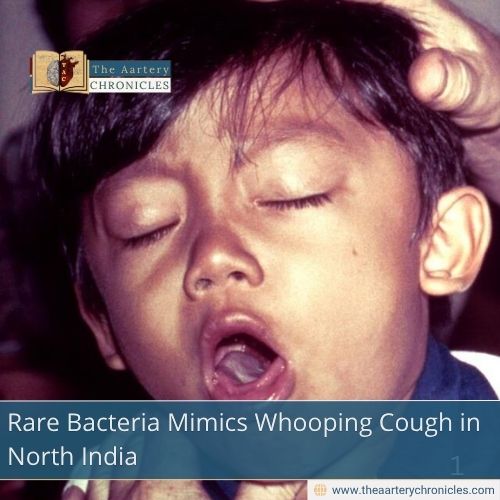

Rare Bacteria Mimics Whooping Cough in North India
A new study from the Postgraduate Institute of Medical Education and Research (PGIMER), Chandigarh, has raised concern over a rare bacterium mimicking whooping cough in North India. Researchers have observed a significant surge in infections caused by Bordetella holmesii, an uncommon pathogen that produces symptoms nearly identical to classical whooping cough (pertussis).
The findings, published in the Emerging Infectious Diseases Journal by the Centers for Disease Control and Prevention (CDC), USA, are based on data collected between 2019 and 2023. The study examined 935 suspected cases of pertussis and revealed that about 37% were actually due to Bordetella holmesii, a proportion now higher than infections caused by Bordetella pertussis, the well-known cause of whooping cough.
Sharp Rise in Cases Among Children
According to PGIMER scientists, the increase in Bordetella holmesii infections was particularly striking in 2023, especially among children aged 5 to 10 years living in northern India. This marks a significant shift in respiratory disease patterns, where illnesses once attributed to pertussis may now be linked to other, lesser-known bacterial species.
Lead researcher Dr Vikas Gautam and his team noted that this discovery could explain the changing trend of respiratory infections seen in outpatient and hospital settings.
Pertussis: Controlled Yet Persistent
Pertussis, commonly known as whooping cough, is a contagious respiratory disease that historically caused high childhood mortality worldwide. Although vaccination programs have drastically reduced their impact in many countries, Asia, especially India and China, continues to face persistent challenges.
After a temporary decline during the COVID-19 pandemic, both nations have seen a strong resurgence of pertussis-like illnesses. India alone recently reported over 13.6 million cases, according to surveillance data.
Long-Term Surveillance Reveals Changing Trends
PGIMER’s continuous disease monitoring since 2015 has uncovered a steady decline in Bordetella pertussis infections, dropping from 15–20% earlier to just 2–5% today. In contrast, Bordetella holmesii infections have sharply risen, suggesting this rare bacterium is emerging as a significant cause of pertussis-like illness in India.
This surveillance work was conducted by Dr. Gautam’s laboratory at PGIMER in collaboration with Dr Prabhu Patil from CSIR–IMTECH, Chandigarh. The same team had earlier identified Stenotrophomonas sepilia, a previously unknown bacterium responsible for sepsis, further establishing PGIMER as a major hub for infectious disease research.
Conclusion
Experts emphasize that the rise of this rare bacterium mimicking whooping cough in North India calls for better diagnostic methods, stronger disease surveillance, and increased awareness among healthcare professionals. Because Bordetella holmesii infections can easily be mistaken for classic pertussis, correct identification is critical for effective treatment and prevention.
“These findings point to an evolving pattern in respiratory infections across India,” said Dr. Gautam. “Ongoing monitoring is vital to understand how these bacteria spread and to avoid misdiagnosis.”
The emergence of Bordetella holmesii as a rare bacterium mimicking whooping cough in North India signals a crucial turning point in the country’s public health landscape. Strengthened laboratory diagnostics and continued research are essential to stay ahead of these changing infection trends.
Source: Inputs from various media Sources
I’m a pharmacist with a strong background in health sciences. I hold a BSc from Delhi University and a pharmacy degree from PDM University. I write articles and daily health news while interviewing doctors to bring you the latest insights. In my free time, you’ll find me at the gym or lost in a sci-fi novel.
- Priya Bairagi
- Health News and Updates,People Forum
- 31 October 2025
- 15:00








